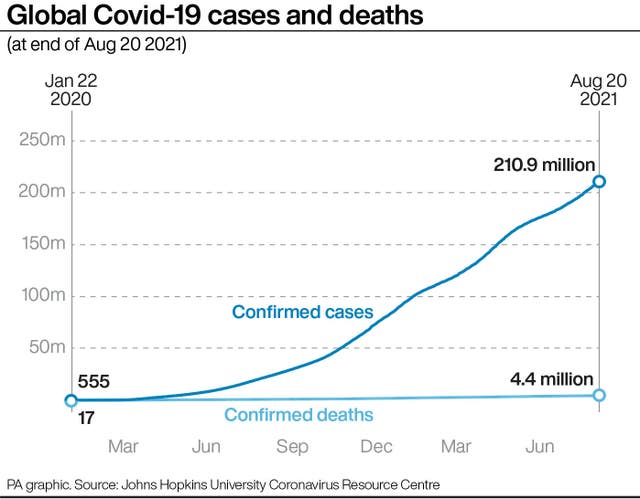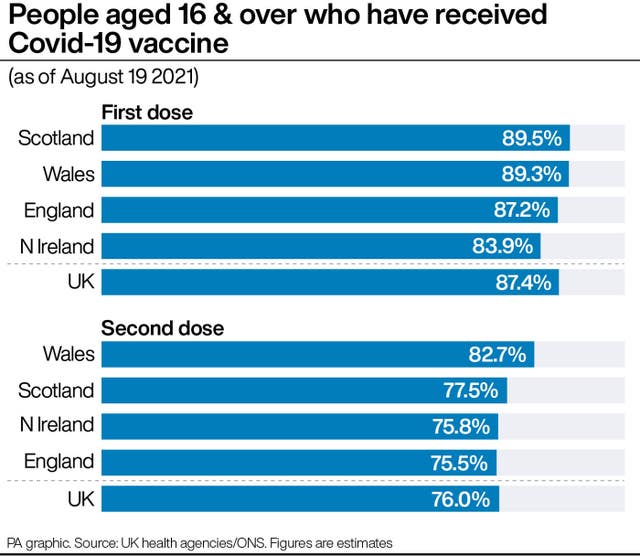
The UK must not take its “eye off the ball” with Covid-19 vaccinations, an expert has said as he warned the virus could come “roaring back”.
Dr Chris Smith, consultant virologist and lecturer at Cambridge University, said a decision on booster jabs should not be “rash, (or) rushed”, and that the Government is considering a more “strategic” approach.
It comes as Health Secretary Sajid Javid said he is “confident” a booster vaccine campaign can start next month despite reports that experts want more time to consider whether they are needed.
Speaking on BBC Breakfast, Dr Smith said: “We all agree that (the pandemic) is not over until it is over in every corner of the world, because otherwise it will just come roaring back.
“Don’t forget we think that this started with a handful of cases in one city, in one corner of one country… and it then eclipsed the entire world.
 (PA Graphics)
(PA Graphics)
“But one must not take one’s eye off the ball here because it would be very easy to unstitch all of the good work we’ve done so far if it turns out with time we do lose immunity because the vaccines wane in their effectiveness.
READ MORE: Infections are rising rapidly again — so what's Plan B?
“As we go into winter, now is a critical period and I think that is why we haven’t seen a rash, rushed decision by the JCVI (Joint Committee on Vaccination and Immunisation) and the Government.”
The UK’s vaccination programme has so far seen around three-quarters of adults fully vaccinated with two doses.

NHS plans are in place to enable a rollout of third doses from September 6, alongside flu vaccines, but unlike in other countries such as Israel, no official decision on the booster programme has yet been taken.
It comes as research found more than three-quarters of adults in every age group say they would be likely or very likely to get a booster jab if offered.Overall, 87% of adults surveyed by the Office for National Statistics said they would be likely or very likely to get a third coronavirus jab.
Likelihood increased with age, with 96% of those aged 70 and over indicating their interest, down to 78% of 16 to 29-year-olds.
Dr Smith said although interventions in certain demographics may be more “strategic”, a decision on a booster campaign rollout needs to be made soon.
“While other countries are embarking on booster programmes, people are taking stock, they are looking at the data and maybe making a decision on how to intervene strategically in certain groups,” he said.
READ MORE: NHS Borders cancels all scheduled routine operations for a further two weeks
“They’re going to have to make a decision soon because winter is soon going to be upon us and it takes time for the programme to be rolled out and it takes time for the vaccines to actually have their effects in these people.”
The debate on boosters comes as England’s Chief Medical Officer drew attention to the “stark” fact that the majority of current coronavirus patients have not been vaccinated.
 (PA Graphics)
(PA Graphics)
Professor Chris Whitty said he had spent four weeks working on a Covid ward and told how many patients “regret delaying” their jabs.
Writing on Twitter, Prof Whitty said there are some “very sick” people in hospital, including young adults, and he urged people to get themselves fully vaccinated.
Meanwhile, the UK’s medicines regulator has approved use of a drug given to former US president Donald Trump when he was admitted to hospital with Covid-19 last year.
It is the first treatment set to be used in the UK using man-made antibodies designed specifically to prevent and fight coronavirus.
Mr Javid hailed the decision by the Medicines and Healthcare products Regulatory Agency about Ronapreve – previously known as REGN-Cov2 – as “fantastic news”, and said he hopes it can be rolled out for patients on the NHS “as soon as possible”.



Why are you making commenting on The Herald only available to subscribers?
It should have been a safe space for informed debate, somewhere for readers to discuss issues around the biggest stories of the day, but all too often the below the line comments on most websites have become bogged down by off-topic discussions and abuse.
heraldscotland.com is tackling this problem by allowing only subscribers to comment.
We are doing this to improve the experience for our loyal readers and we believe it will reduce the ability of trolls and troublemakers, who occasionally find their way onto our site, to abuse our journalists and readers. We also hope it will help the comments section fulfil its promise as a part of Scotland's conversation with itself.
We are lucky at The Herald. We are read by an informed, educated readership who can add their knowledge and insights to our stories.
That is invaluable.
We are making the subscriber-only change to support our valued readers, who tell us they don't want the site cluttered up with irrelevant comments, untruths and abuse.
In the past, the journalist’s job was to collect and distribute information to the audience. Technology means that readers can shape a discussion. We look forward to hearing from you on heraldscotland.com
Comments & Moderation
Readers’ comments: You are personally liable for the content of any comments you upload to this website, so please act responsibly. We do not pre-moderate or monitor readers’ comments appearing on our websites, but we do post-moderate in response to complaints we receive or otherwise when a potential problem comes to our attention. You can make a complaint by using the ‘report this post’ link . We may then apply our discretion under the user terms to amend or delete comments.
Post moderation is undertaken full-time 9am-6pm on weekdays, and on a part-time basis outwith those hours.
Read the rules hereLast Updated:
Report this comment Cancel